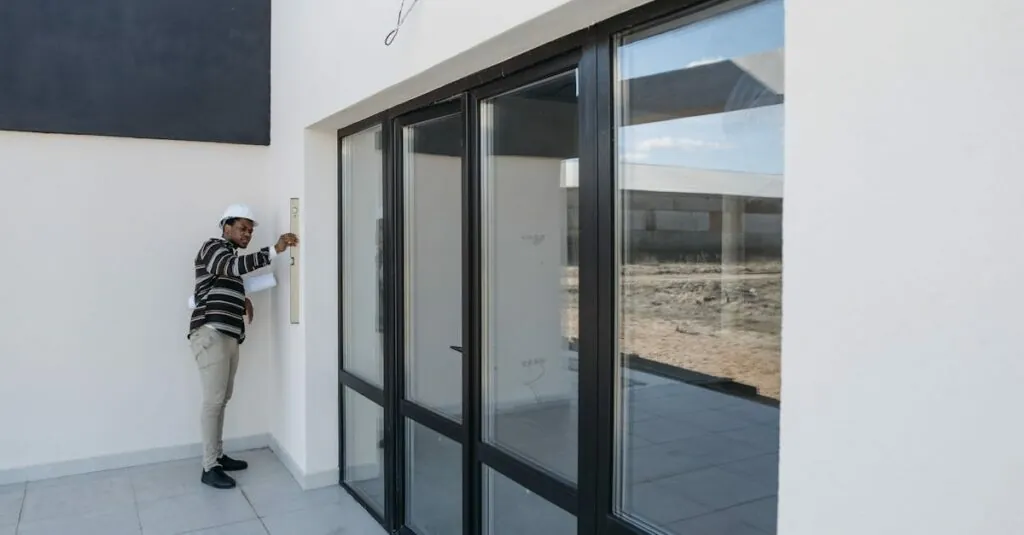Table of Contents
ToggleBuying a home is like dating—everyone wants to find “the one,” but you don’t want to end up with a fixer-upper that’s more trouble than it’s worth. Enter the FHA home inspection requirements, your trusty sidekick in the quest for a perfect abode. These guidelines aren’t just bureaucratic mumbo jumbo; they’re your safety net, ensuring that the charming facade doesn’t hide a leaky roof or a questionable foundation.
Navigating the world of home buying can feel like trying to decipher ancient hieroglyphics, but understanding FHA requirements can save you from potential heartbreak. With a little know-how, you can confidently stride into your new home, knowing it meets the standards that keep your dreams—and your wallet—intact. Let’s dive into what you need to know to make your home-buying journey smooth and maybe even a little fun.
Overview of FHA Home Inspection Requirements
FHA home inspection requirements focus on ensuring the property meets safety and livability standards. Buyers must know that these inspections assess various aspects of the home, including structural integrity, electrical systems, plumbing, and safety hazards. Significant problems detected during this inspection can lead to increased repair costs or even affect loan eligibility.
The Federal Housing Administration (FHA) mandates these inspections to protect both buyers and lenders. Buyers should seek a qualified FHA appraiser, as they are responsible for identifying issues that violate FHA standards. Common deficiencies include roofing problems, hazardous electrical connections, or plumbing leaks. Any major defects typically must be repaired before finalizing the loan.
Understanding the scope of FHA inspections is crucial for prospective buyers. The inspection doesn’t cover cosmetic issues; however, it ensures the home is habitable and safe. Compliance with local building codes is also part of the inspection process. Properties finding themselves outside these guidelines may face challenges in securing FHA financing.
Buyers often overlook the significance of routine maintenance. Neglecting simple repairs can lead to bigger problems that FHA inspections may reveal. To navigate these requirements effectively, staying informed about local regulations and preparing for potential repairs remains essential. Homes in poor condition that fail inspections could significantly hinder the closing process, emphasizing the need for thorough evaluation before making a purchase.
Importance of FHA Home Inspections
FHA home inspections play a critical role in ensuring properties align with safety and livability criteria. These inspections not only identify significant issues but also help buyers make informed decisions.
Ensuring Property Safety
FHA inspections assess structural integrity, electrical systems, and plumbing. Finding potential hazards, such as faulty wiring or roof damage, enables buyers to address issues before they escalate. Inspectors examine safety hazards, ensuring homes comply with local building codes. An inspection verifies conditions are safe for occupants, protecting families from unforeseen dangers. These evaluations help prevent costly repairs in the future, maintaining a safe living environment.
Protecting Buyer Interests
FHA inspections serve to safeguard buyer interests by revealing hidden problems. Identifying major deficiencies can affect loan eligibility, potentially impacting financing options. Buyers avoid financial pitfalls by knowing the property’s condition upfront. Furthermore, these inspections ensure compliance with FHA standards, facilitating smoother transactions. With thorough evaluations, buyers can negotiate repairs or reconsider their purchase if major issues arise. FHA mandates these inspections to encourage transparency, fostering trust between buyers and lenders.
Key Components of FHA Home Inspections
FHA home inspections focus on essential components of a property. These evaluations ensure homes meet safety and livability standards.
Structural Integrity
Inspectors assess structural integrity to confirm stability and safety. They examine foundations, walls, roofs, and framing for any signs of significant damage or deterioration. Cracks, sagging, or evidence of water intrusion can indicate problems that need immediate attention. Issues like these not only affect livability but can also complicate financing options. Homes with major structural deficiencies often fail inspections, necessitating repairs before a successful closing.
Electrical Systems
Electrical systems inspection seeks to identify potential hazards. Inspectors look for outdated wiring, inadequate grounding, and improper connections. They also check that outlets and service panels function correctly. Faulty wiring can pose fire risks, leading to severe consequences for occupants and homeowners. Compliance with local codes is crucial. Ensuring that the electrical system meets FHA requirements is vital for securing loans and protecting buyer interests.
Plumbing and Heating
Plumbing and heating systems are crucial for a home’s functionality. During inspections, evaluators check for leaks, corroded pipes, and adequate water pressure. Heating systems must operate efficiently to ensure comfort and safety. Problems with plumbing or heating can lead to costly repairs and damage. FHA standards require that these systems are in good working order, impacting the buyer’s ability to secure financing if issues arise.
Safety Hazards
Addressing safety hazards is a top priority during FHA inspections. Inspectors search for issues such as loose railings, mold, and inadequate fire safety measures. These dangers can threaten occupants and may also hinder the closing process. Compliance with local building codes ensures that the property is habitable and safe. Identifying and rectifying hazards before finalizing a purchase not only protects the buyer but also fosters a reliable transaction between buyer and lender.
Common Issues Found During FHA Inspections
FHA inspections often reveal critical issues that require attention before closing on a home. Buyers should be aware of these common problems to ensure a smooth transaction.
Roof Problems
Roofing issues frequently surface during inspections. Inspectors look for missing shingles, leaks, and signs of deterioration. Damaged roofing can lead to significant water damage or mold growth, impacting the home’s integrity. Homeowners might face costly repairs if these issues remain unaddressed. Roofs older than 15 years may require immediate evaluation, affecting both livability and loan eligibility.
Foundation Concerns
Foundation concerns contribute significantly to FHA inspection findings. Inspectors assess cracks, bowing walls, or uneven floors, all indicative of potential structural problems. These issues can threaten safety and lead to extensive repairs, potentially derailing financing options. If a foundation appears compromised, buyers should consider getting a specialist’s evaluation to determine necessary repairs. Early detection of foundation issues enhances the buyer’s negotiating power and prevents future complications.
Pest Infestations
Pest infestations often emerge during FHA inspections, highlighting the importance of thorough evaluations. Inspectors search for evidence of termites, rodents, or other pests that could damage a property. Infestations can undermine structural integrity and pose health risks, requiring immediate intervention. Buyers may need to invest in pest remediation before finalizing their purchase to protect their investment. Identifying pest issues allows buyers to address them proactively, ensuring a safe living environment.
Preparing for an FHA Home Inspection
Preparing for an FHA home inspection involves diligence and awareness. Sellers and buyers both play essential roles in ensuring a smooth process.
Steps for Sellers
Sellers should conduct a preliminary home inspection before listing their property. Addressing known issues, such as roof repairs or plumbing leaks, enhances the home’s appeal. Ensuring compliance with local building codes demonstrates the property’s safety. Documentation of any previous repairs can also reassure potential buyers. Cleaning and decluttering the home makes it easier for inspectors to assess the property’s condition. Finally, being flexible with inspection scheduling encourages potential buyers to proceed.
Tips for Buyers
Buyers must familiarize themselves with common FHA inspection requirements. Reviewing the property’s history, including past repairs or upgrades, offers valuable insights. Engaging with a qualified FHA appraiser ensures compliance with safety standards. Being present during the inspection allows buyers to ask questions and understand issues firsthand. Prioritizing serious problems, such as structural or electrical issues, helps buyers make informed decisions. Lastly, budgeting for potential repairs can prevent financial strain if significant issues arise post-inspection.
Understanding FHA home inspection requirements is vital for anyone navigating the home-buying process. These inspections not only safeguard buyers from unexpected repairs but also ensure that properties meet essential safety and livability standards. By being aware of potential issues and preparing accordingly, buyers can make informed decisions that lead to a successful purchase.
Sellers who proactively address concerns can facilitate smoother transactions. Ultimately, a thorough inspection fosters transparency and trust between all parties involved, paving the way for a positive home-buying experience. Prioritizing these inspections can save buyers time, money, and stress in the long run.







